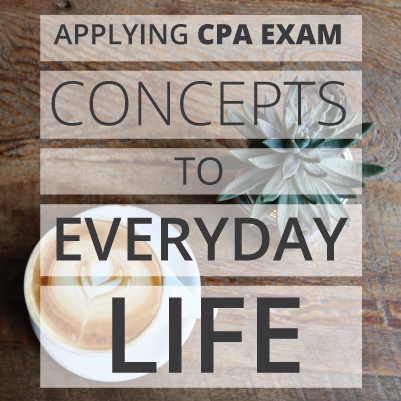I have began looking at things in my life differently since I started my CPA studies. There are many things that I do differently now than I would have done before I started studying accounting. I think that being able to apply accounting principles to everyday life has been a great asset for me. Here are three principles that I use frequently.
The biggest thing I learned was how to use Economic Concepts to help understand things I see.
An example of this is Market equilibrium (the demand and supply curve cross, so that there is adequate supply to satisfy buyers and adequate demand to allow suppliers to sell their outputs). I graduated from school in 2012 and I was offered two jobs. One was auditing in NYC and the other was tax in Detroit. They were both positions in Big 4 firms and to my surprise, the salaries only differed by $2,000. I ended up taking the job in NYC, but I was curious as to why the salaries were so similar. The living cost in Detroit is only 45% of the cost in NYC according to CNN Money, but the salary was almost the same. I realized it was because of demand and supply curves. The supply of people looking for jobs in NYC is greater than the demand in Detroit. However, in Detroit, the firms must have higher salaries to attract employees.
Another thing that I always keep in mind is the concept of variable and fixed costs.
In order to reduce fixed costs, I stopped many unnecessary fixed cost expenses such as expensive phone service and cable service. Thus, my husband and I were able to buy a house in a location we wanted and still feel secure when it comes to our finance. I sometimes feel surprised by the fact many people worry about one time (variable) costs, but not fixed costs.
Lastly is opportunity cost. Simply put, it’s what you give up in order to do something.
It is always important to think about the opportunity cost when you make a decision in life. From our careers to our individual housing situations to how we invest and where to go to school, understanding the opportunity cost can be key. For example, I looked at several schools when I decided to get my Master’s. The school I chose is fairly small, but affordable with small class sizes. I understood that the opportunity cost for this decision was giving up the name recognition of larger schools and the networking opportunities. This turned out to be a good tradeoff and I was able to get a job at one of the Big 4’s without school debt.
There are many concepts that you learn while studying to be a CPA. Some are very practical and helpful in your life. I hope that you find some concepts that fit your needs and help you to make wise decisions in life as well. Good luck!
–J. Frazier, Guest Blogger for Roger CPA Review
